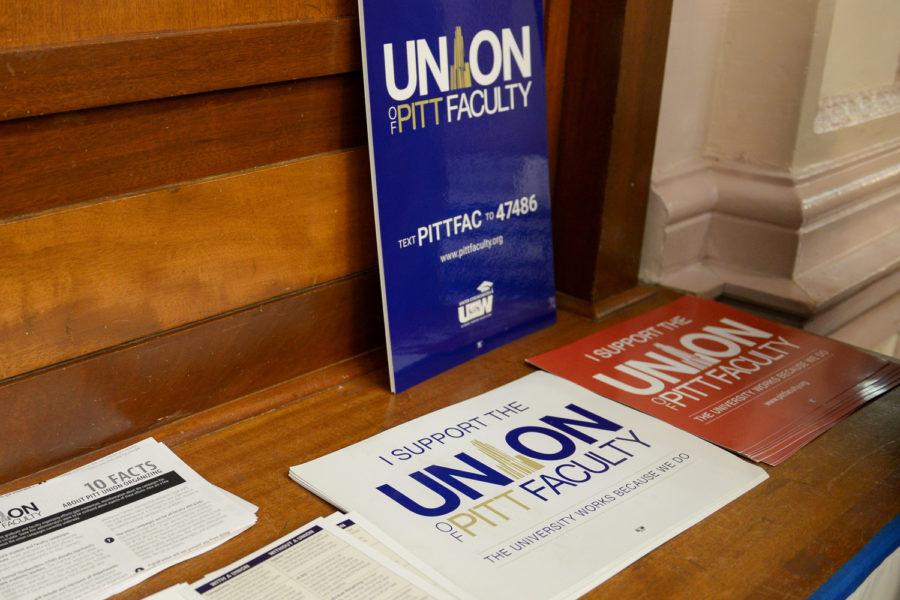Solidarity, serenity and slow negotiations: Faculty look back on year since unionization


Pitt Faculty Union flyers on a campus table.
The impact of unionization hasn’t just played out at the bargaining table in the year since the Pennsylvania Labor Relations Board certified the Pitt faculty union’s landslide election victory.
“The union itself and the colleagues who are involved are devoted to making sure the union is not just an institution, but actually is a supportive network for people, so that has meant the world,” said Bridget Keown, assistant professor in the gender, sexuality and women’s studies program.
During the union’s first year, faculty have changed from advisors in a shared governance system to legal equals in slow and, at times, publicly bitter contract talks with administration.
For Melinda Ciccocioppo, the very existence of negotiations, however strained, gives her “a real sense of serenity.”
“The collective bargaining process gives faculty a real say in decision-making that we didn’t have access to before,” Ciccocioppo, chair of the union’s Communication and Action Team, said. “And it means that before the administration can change any policies, they have to actually come and talk to us first.”
Since bargaining began in late February, the two sides have agreed to a severability clause in the contract and regular meetings post-ratification. The union also announced expanded COVID-19 protections for faculty in August.
From her perspective, Keown named the ability to request COVID-19 protections outside the Americans with Disabilities Act as the union’s most impactful bargaining win so far.
“It’s not necessarily something I’ve had to take advantage of myself, but knowing that it is an option is a huge relief for me, especially as someone who has parents who are going through a lot of health issues,” Keown said.
Separate from a full contract, part-time faculty gained a 3.25% cost of living raise for the 2022-2023 year, according to a September bargaining update.
“More so than even just giving [part-time faculty] more money, it shows respect for their work,” Ciccocioppo said.
According to Laura McCarthy, an adjunct professor of social work, unionization lifted barriers to building relationships with colleagues.
“Being an adjunct, we don’t have a lot of connection with other folks because we’re so part-time,” McCarthy said. “It’s nice to have a little better network.”
McCarthy also serves as secretary for the union’s Council of Representatives. She’s felt not only support from colleagues, but solidarity across the network of United Steelworkers members.
McCarthy marched alongside fellow Steelworkers in the latest Labor Day parade, an experience that made her “really happy to be an educational worker and proud to be a Steelworker.”
Looking ahead, the union will push for increased job security through its “Job Security = Emotional Well-Being” campaign, a play on Provost Ann Cudd declaring the 2022-2023 academic year the “Year of Emotional Well-Being.”
The bargaining committee submitted a proposal in July to implement automatic contract renewals for faculty on short-term appointments, but has yet to reach an agreement with administration on the issue.
Frustrated with protracted negotiations over job security, over 150 faculty union members gathered in protest at Posvar Hall during a bargaining session on Thursday.
For Ciccocioppo, stable working conditions for professors create better learning conditions for students.
“Great job security, especially for non-tenure stream faculty … means that students can rely on us to be around in the future to write letters of recommendation for them. It means that they can rely on their favorite instructor being there to teach other courses that they might want to take in the future,” Ciccocioppo said. “And I think that really matters.”
Keown worked towards forming a graduate student union at Northeastern University while pursuing her doctorate. It’s a movement she still supports, but found taxing to organize.
The organizing process at Pitt was a “breath of fresh air” for Keown and keeps her optimistic about an eventual contract.
A Bloomberg Law analysis shows an average of 466 days for new unions and employers in the education sector to reach a collective bargaining agreement post-election.
Several faculty members said it would be unrealistic to expect a contract by February, but progress reports from the union continue to roll in.
Most recently, the union and administration have nearly settled on the contract’s non-discrimination language. The impasse centers on the range of categories the union wants to include — caste, weight, height, health or medical status and family care leave status, in addition to lawfully protected categories.
As for the anniversary, the union didn’t plan an elaborate commemoration. Ciccocioppo, for one, is holding out for a bigger milestone.
“We will certainly have a celebration when our first contract is ratified,” Ciccocioppo said. “We will have a nice big party to celebrate all of our wins.”
Recent Posts
Pitt speech and debate team heads to nationals
The William Pitt Debating Union, Pitt’s speech and debate team, sends students to both in-person…
Visuals: A Year in Review
The visuals desk had an interesting year. In the midst of the 2024 Presidential Election,…
De-stress events across campus offer students a break from studying
During finals week, departments across campus are offering wellness events to help students manage stress…
Pitt students share their summer plans
After a long and strenuous academic year, many students are excited to take a break.…
Column | Collaboration and connection make us better — yes, even in journalism
Today is the last day I will ever do this, and despite the amount of…
Column | Things done and left undone
The saddest part of it all is not the fact that I will have to…

